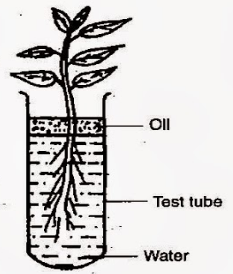Sponsor Area
Transpiration
An apparatus as shown below was set up to investigate a physiological process in plants. The setup was kept in sunlight for two hours. Droplets of water were then seen inside the bell jar. Answer the questions that follow:
i. Name the process being studied.
ii. Explain the process named above in ii.
iii. Why was the pot covered with a plastic sheet?
iv. Suggest a suitable control for this experiment.
v. Mention two ways in which this process is beneficial to plants.
vi. List three adaptations in plants to reduce the above mentioned process.
i. Transpiration
ii. The loss of water in the form of water vapour from the aerial parts of the plant body is known as transpiration.
iii. To prevent the escape of moisture into the atmosphere
.
iv. A bell jar without plant is a suitable control.
v. It brings cooling affect to the plant and develop suction force to pull the water to the top of plant.
vi. Three modifications are ;
a. Leaves become narrow.
b. Thick cuticle on the surface of leaves.
c. Leaves are modified into thorns or spine.
Some More Questions From Transpiration Chapter
An apparatus as shown below was set up to investigate a physiological process in plants. The setup was kept in sunlight for two hours. Droplets of water were then seen inside the bell jar. Answer the questions that follow:

i. Name the process being studied.
ii. Explain the process named above in ii.
iii. Why was the pot covered with a plastic sheet?
iv. Suggest a suitable control for this experiment.
v. Mention two ways in which this process is beneficial to plants.
vi. List three adaptations in plants to reduce the above mentioned process.

i. Name the process being studied.
ii. Explain the process named above in ii.
iii. Why was the pot covered with a plastic sheet?
iv. Suggest a suitable control for this experiment.
v. Mention two ways in which this process is beneficial to plants.
vi. List three adaptations in plants to reduce the above mentioned process.
Study the diagram given below and answer the following questions:

(i) Name the process being studied in the above experiment.
(ii) Explain the process mentioned in (i) above.
(iii) Why is oil placed over water?
(iv)What do we observe with regard to the level of water when this setup is placed in
(1) bright sunlight, (2) humid conditions and (3) on a windy day?
(v) Mention any three adaptations in plants to overcome the process mentioned in (ii)

Mention the effects of two individuals in a street fight on the following organs by the autonomous nervous system (one has been done for you).
Organ
Sympathetic nervous system
Para-sympathetic nervous system
eg Lungs
Dilates bronchi and brochioles
contricts bronchi and bronchioles
1) Heart
2 Pupils of the eye
3 . Salivary
2 Pupils of the eye
3 . Salivary
(ii) List four major activities of the Red Cross.
Name the following:
(ii) A plant with sunken stomata.
(ii) A plant with sunken stomata.
There are five sets consisting offive terms given below. In each set, there is a word
which is an odd one. For each of these sets, write down the category of the group
having identified the odd one out, as shown in the example:
Example: (0) cell wall, vacuole, centrosome, plastids, mitochondria
S.no
Category
Odd one
0
Organelles of plant cell
Centrosome
(i) Blinking, Knitting without looking, Smiling, Blushing, Crying
which is an odd one. For each of these sets, write down the category of the group
having identified the odd one out, as shown in the example:
Centrosome
Choose the correct answer to the following statements out of the three choices given
after each statement.
Loss of water as droplets from hydathodes is called
after each statement.
Loss of water as droplets from hydathodes is called
Account for the following:
(iii)The leaves of certain plants roll up on a bright sunny day.
Sponsor Area
Mock Test Series
Mock Test Series





